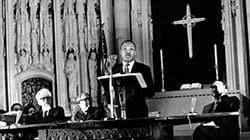Pyschologist: Church can act as healing agent in midst of crisis
By Dr. Sally Quiñones-Rodríguez
When I read and hear about recent tragedies—such as the massacre at Pulse nightclub in Orlando, the assassination of Philando Castile and police killings in Dallas—my memory reverts to other violent acts, such as those at Columbine High School (1999) and Virginia Tech (2007).
Each of these acts was orchestrated by the same face, albeit with different masks—racism, terrorism, prejudice. The face is “violence” in its worst forms of expression. The violence is being used to carry a wrong message. The problem is further aggravated when the responses to these acts are the same as if the negative message were appropriate. As Christians, we do know that we cannot change facts; however, we can change or improve our responses to these acts so that society can see the Church as an agent for healing in the midst of crisis.
In his book El laberinto de la Violencia (“The Violence Labyrinth”), Jose Sanmartin considers physiological, psychological and environmental factors in explaining violence and aggression. He concludes that the environment and the brain fuse in an insoluble relationship because many brain reactions are responses to environmental stimuli. The social psychologist Leonard Berkowitz states that the manner in which news outlets report on violence influences the audience to the point of inciting further violence. Some groups are more vulnerable than others to influence because of circumstances. According to experts in human behavior, violence that is shown in the media and by people of influence can be perceived as socially acceptable.
Because of this brain-environment relationship, these acts need to be interpreted from socio-cultural and political perspectives as well as an individual perspective to enact appropriate measures of security and/or prevention. As the Church, it is necessary that we make our position known in rejecting such acts of hatred.
That said, what can we do as individuals? On a personal level, we should analyze our own discourse to determine whether our ways of talking reflect some sort of prejudice, discrimination or inequality. Examining our expressions will provide introspection into the nature of our discourse, and whether or not it contains discriminatory tones and prejudices. In this way, we are forming part of the solution.
Another question relates to how we can help victims of these acts. Each of these aggressive acts inflicts pain, terror, trauma and indignation, which in turn leaves emotional and psychological sequelae in those directly injured or indirectly involved (family members, friends or others). These individuals may present completely normal psychological and emotional responses to these abnormal events in their lives. When a person faces situations of violence or threat, it is reasonable to expect them to show some type of emotional and psychological symptoms.
An organism needs to process experiences in one way or another, whether adequately or inadequately. Therefore, the person may present nightmares related to the event, insecurity, isolation, flashbacks, terror, sleeping problems, anxiety, constant worry or anger. Furthermore, an individual may present physical symptoms, such as headaches, stomach pain, sweating and hyperventilation. The reactions may also include behavioral responses, such as avoidance behavior, or avoiding places or people that are reminders of the adverse event.
These symptoms are all characteristic of post-traumatic stress disorder (PTSD). Diagnosis of PTSD depends on how long symptoms persist, so it is important that the person be evaluated by a professional as soon as possible. It is important that we are aware of the possibility of PTSD, and that we familiarize ourselves with the disorder so that we can identify it and be prepared to properly manage it.
For individuals who have lived through traumatic events, support is an important aspect for recovery. After surviving a traumatic event, a person’s sense of security has been violated, making it difficult to trust others. Trauma survivors often live in constant fear that something similar will happen again. For this reason, they remain hypervigilant. Showing support and reminding the person that he or she is not alone are crucial for healing and helping the person to reconnect with the external world—a world that has been perceived as hostile and insecure. It is imperative to be careful with word selection because many people with good intentions may bring guilt, more pain or, worse, come across as minimizing the person’s reality. For example, avoid telling someone who is showing symptoms, “Do not feel that way,” “This too shall pass” or asking “Where is your faith?” It is important to express that what the person is experiencing is normal, and to validate his or her emotions with expressions such as “I can imagine that it is not easy,” which bring emotional relief and demonstrate a more empathetic tone.
Many survivors experience high levels of anxiety and/or panic attacks. Deep breathing can help them regulate their responses to anxiety. Help survivors by learning about and teaching them deep relaxation techniques. The creation of support groups is another option. Groups should be created by professionals trained in the subject or by survivors themselves. Some churches may not have professionals who can lead groups but do have physical infrastructure to provide a safe place to meet. Another aspect that is important to touch upon in the healing process is resilience, or a person’s capacity to transform adverse and painful events into expressions of growth. This subject can be dealt with from the pulpit. Educating people about resiliency will help them to deal with adverse events by utilizing their own internal resources.
Without a doubt, recovery from violent events takes time. However, as churches, we can provide assistance to survivors and their families. It is an opportunity to show them the face of Jesus and God’s caring.
Dr. Sally Quiñones-Rodríguez is a clinical psychologist at Oficina de Servicios Psicológicos San Juan, Puerto Rico.
Previous Story | Story 11 of 16 | Next Story
— The Christian Citizen —


